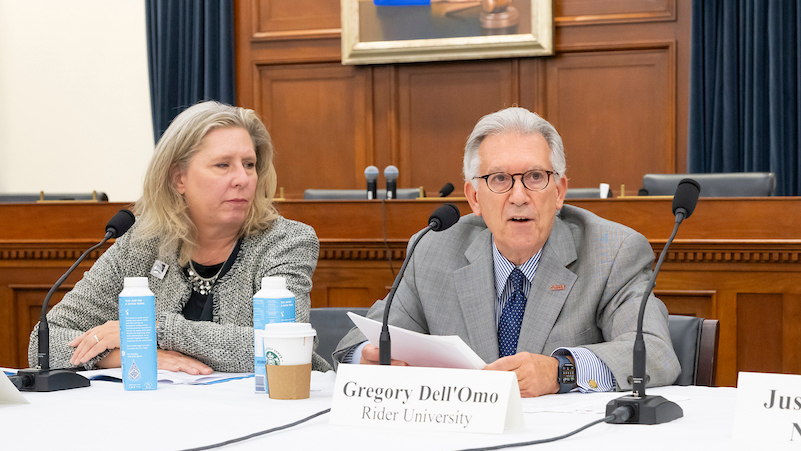Friday, Sep 27, 2024
Gregory G. Dell’Omo, Ph.D., explains the impact on enrollment, students, families and financial aid staff
by Rachel Stengel '14, '20

Rider University President Gregory G. Dell’Omo, Ph.D., was invited to speak about the impacts of the new Free Application for Federal Student Aid (FAFSA) process on college and university enrollment in Washington, D.C., on Sept. 24. The briefing was sponsored by the Congressional Independent Colleges Caucus, which is dedicated to addressing the issues facing private, nonprofit colleges and educating colleagues about the sector.
The session began with remarks from Rep. Derek Kilmer (D-WA), current co-chair of the Independent Colleges Caucus, and Rep. Deborah Ross (D-NC), who will assume the co-chair role at the beginning of the 119th Congress. Dell’Omo was also joined by Justin Monk, director of student and institutional aid for the National Association of Independent Colleges and Universities (NAICU), to brief congressional staffers on the myriad of issues that have plagued private universities as a result of the 2024-25 FAFSA. The session was moderated by Suzanne Stokes Vieth, NAICU’s director of state relations and outreach.
In his remarks, Dell’Omo explained that the lengthy delays and errors in the rollout of a new FAFSA significantly impacted fall 2024 enrollment, especially for private, tuition-dependent institutions like Rider.
“Tuition-dependency makes institutions like Rider particularly sensitive to changes in enrollment numbers, which, unfortunately, was just what we saw last year as a result of the delayed rollout of the new FAFSA form,” says Dell’Omo.
Not only were fewer FAFSA applications being completed — a critical step in creating financial aid packages for students — but there were monthslong delays in institutions receiving the data needed from the federal government for those that did complete the FAFSA. Combined, these factors placed a major strain on financial aid departments as they struggled to process financial aid packages more quickly and within a compressed time frame. Students who would have normally received a financial aid package as early as December, were left waiting many months to receive theirs.
“Prospective students, unsure of how much aid they would receive, were forced to make decisions about their future without a full picture of their financial aid options,” says Dell’Omo. “This led to declines in enrollment yields, even when interest and engagement from applicants was otherwise strong.”
It is imperative that the FAFSA issues are addressed to ensure that every student has access to the financial resources they need for their education.”
The FAFSA issues must be fixed for this upcoming enrollment cycle to ensure that students are equipped with all the information they need to make an informed decision, Dell’Omo says.
In July 2024, NAICU surveyed over 400 member colleges and universities about the impact of the FAFSA delay and changes to the need analysis formulas. The survey found that:
- Three out of four private, nonprofit colleges and universities reported issues with FAFSA availability and processing.
- Half of the colleges reported that their incoming class was more difficult to fill.
- 43% of the colleges reported a smaller incoming class.
- 18% of respondents reported that FAFSA problems reduced the racial or ethnic diversity of freshman classes.
- 27% of respondents said they logged fewer financial aid recipients.
Dell’Omo says that looking forward, all institutions nationwide need a level of confidence that this year’s FAFSA application will be available by Dec. 1, as announced by the Department of Education.
“Institutions have done their part in becoming more proactive in guiding prospective and current students through the new system to ensure that those eligible for aid are not left behind due to bureaucratic hurdles,” he says. “It is imperative that the FAFSA issues are addressed to ensure that every student has access to the financial resources they need for their education.”
